-
 Bitcoin
Bitcoin $83,443.6737
-1.76% -
 Ethereum
Ethereum $1,825.6264
-3.20% -
 Tether USDt
Tether USDt $0.9997
-0.02% -
 XRP
XRP $2.0597
-2.32% -
 BNB
BNB $597.9023
-1.48% -
 Solana
Solana $119.3459
-5.03% -
 USDC
USDC $0.9999
-0.01% -
 Dogecoin
Dogecoin $0.1660
-3.39% -
 Cardano
Cardano $0.6523
-3.11% -
 TRON
TRON $0.2359
-1.14% -
 Toncoin
Toncoin $3.8299
-5.08% -
 UNUS SED LEO
UNUS SED LEO $9.3665
0.55% -
 Chainlink
Chainlink $13.1586
-4.88% -
 Stellar
Stellar $0.2618
-2.77% -
 Sui
Sui $2.3705
0.07% -
 Avalanche
Avalanche $18.4778
-4.84% -
 Shiba Inu
Shiba Inu $0.0...01228
-1.59% -
 Hedera
Hedera $0.1637
-2.32% -
 Polkadot
Polkadot $4.0481
-1.61% -
 Litecoin
Litecoin $83.0708
-0.33% -
 MANTRA
MANTRA $6.3449
1.40% -
 Bitcoin Cash
Bitcoin Cash $299.2669
-2.15% -
 Bitget Token
Bitget Token $4.5420
-2.09% -
 Dai
Dai $0.9999
0.00% -
 Ethena USDe
Ethena USDe $0.9999
0.02% -
 Pi
Pi $0.6659
-4.49% -
 Hyperliquid
Hyperliquid $12.4532
-5.21% -
 Monero
Monero $215.7704
-0.13% -
 Uniswap
Uniswap $5.9598
-3.90% -
 Aptos
Aptos $5.2030
-1.76%
How to recharge Ouyi web3 wallet
To recharge your Ouyi Web3 Wallet, simply navigate to "Assets" on the Ouyi exchange, select "Web3 Wallet," and click "Deposit" for the desired cryptocurrency to obtain your unique wallet address.
Oct 19, 2024 at 12:05 pm

How to Recharge Ouyi Web3 Wallet
Step 1: Get Your Wallet Address
- Log in to your Ouyi account on the Ouyi exchange website or mobile app.
- Navigate to "Assets" and click on "Web3 Wallet."
- Select the cryptocurrency you want to deposit and click "Deposit."
- Your wallet address will be displayed.
Step 2: Send Funds to Your Wallet
- Copy the wallet address and paste it into the sending field of your external wallet or exchange.
- Enter the amount you want to deposit and click "Send."
Tips:
- Ensure that you are sending the correct cryptocurrency to the correct wallet address.
- Wait for the transaction to be confirmed. Confirmation times vary depending on the cryptocurrency and network conditions.
- You can check the status of your transaction on the corresponding blockchain explorer.
Example:
To deposit USDT to your Ouyi Web3 Wallet, you would follow these steps:
- Log in to the Ouyi website and navigate to "Assets."
- Click on "Web3 Wallet" and select "USDT."
- Click "Deposit" and copy your USDT wallet address.
- Paste the address into the sending field of your USDT wallet.
- Enter the amount you want to deposit and click "Send."
Note:
- Ouyi charges a small fee for withdrawals.
- The minimum deposit amount may vary depending on the cryptocurrency.
- If you encounter any issues, you can contact Ouyi customer support for assistance.
Disclaimer:info@kdj.com
The information provided is not trading advice. kdj.com does not assume any responsibility for any investments made based on the information provided in this article. Cryptocurrencies are highly volatile and it is highly recommended that you invest with caution after thorough research!
If you believe that the content used on this website infringes your copyright, please contact us immediately (info@kdj.com) and we will delete it promptly.
- Grayscale Launches Two New Bitcoin-Themed Exchange-Traded Funds (ETFs) Targeting Income Generation
- 2025-04-03 10:15:21
- China Discovers Massive 1,000-Ton Gold Deposit in Its Northeast
- 2025-04-03 10:15:21
- Fidelity Investments introduces an individual retirement account (IRA) that permits private investors to invest in cryptocurrencies
- 2025-04-03 10:10:13
- President Donald Trump Announces Sweeping Reciprocal Tariffs on Global Imports and Declares April 2, 2025, “Liberation Day”
- 2025-04-03 10:10:13
- The price of Solana (SOL) is desperately trying to remain above important support levels amid increasing pressure
- 2025-04-03 10:05:13
- Ethereum (ETH) is again in the limelight, since technical indicators indicate bullish and network activities to a possible turnaround.
- 2025-04-03 10:05:13
Related knowledge
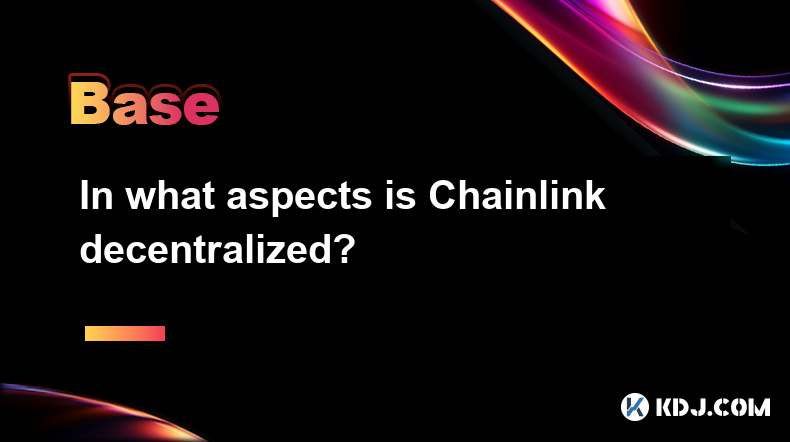
In what aspects is Chainlink decentralized?
Apr 02,2025 at 05:49pm
Chainlink is a decentralized oracle network that plays a crucial role in connecting smart contracts on blockchain networks with real-world data. Its decentralization is reflected in multiple aspects, ensuring the network's security, reliability, and integrity. This article delves into the various ways Chainlink achieves decentralization, including its n...

How does Chainlink connect smart contracts with real-world data?
Apr 02,2025 at 03:56pm
Chainlink is a decentralized oracle network that plays a crucial role in connecting smart contracts on blockchain platforms with real-world data. Smart contracts are self-executing contracts with the terms of the agreement directly written into code, but they can only interact with on-chain data. To access real-world data, such as stock prices, weather ...
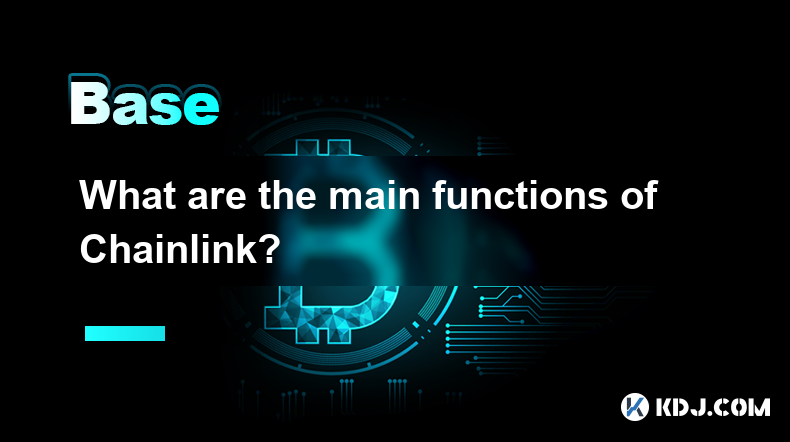
What are the main functions of Chainlink?
Apr 02,2025 at 11:49pm
Chainlink is a decentralized oracle network that plays a crucial role in connecting smart contracts with real-world data and external APIs. The primary function of Chainlink is to facilitate the seamless integration of off-chain data into on-chain smart contracts, enabling them to execute based on real-world events and information. This integration is v...
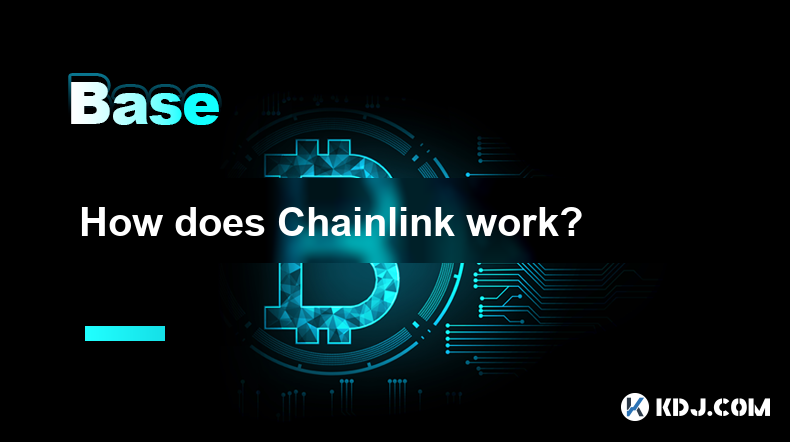
How does Chainlink work?
Apr 03,2025 at 01:50am
Chainlink is a decentralized oracle network that connects smart contracts with real-world data and external APIs. It plays a crucial role in the blockchain ecosystem by enabling smart contracts to interact with data outside their native blockchain environment. This connectivity is essential for smart contracts to execute based on real-world events and d...
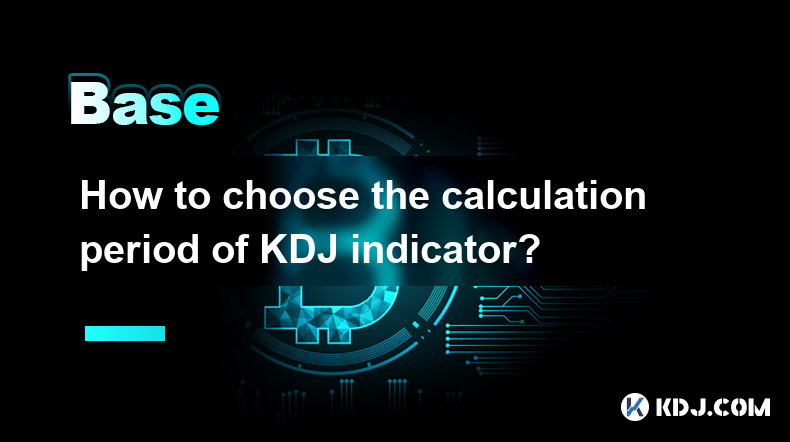
How to choose the calculation period of KDJ indicator?
Apr 02,2025 at 01:00pm
The KDJ indicator, also known as the Stochastic Oscillator, is a popular technical analysis tool used by cryptocurrency traders to identify potential buy and sell signals. The calculation period of the KDJ indicator is crucial in determining its effectiveness in predicting market trends. In this article, we will explore the factors to consider when choo...
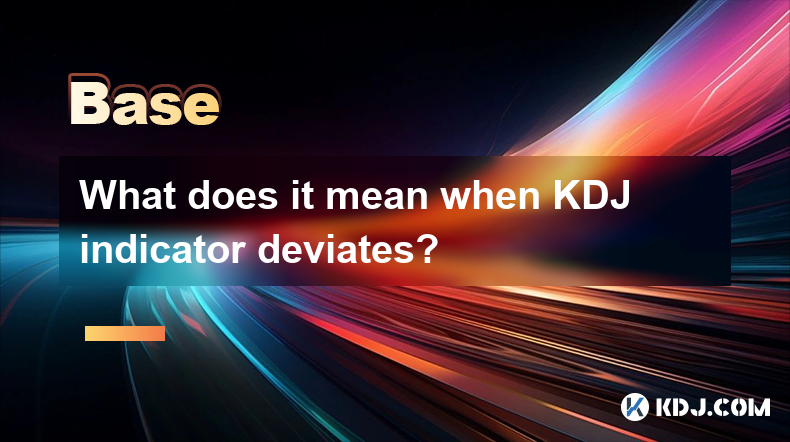
What does it mean when KDJ indicator deviates?
Apr 01,2025 at 03:08pm
The KDJ indicator, also known as the Stochastic Oscillator, is a popular technical analysis tool used in the cryptocurrency market to predict price movements. When the KDJ indicator deviates, it means that the current price of a cryptocurrency is moving away from its typical range, as indicated by the KDJ lines. This deviation can signal potential trend...

In what aspects is Chainlink decentralized?
Apr 02,2025 at 05:49pm
Chainlink is a decentralized oracle network that plays a crucial role in connecting smart contracts on blockchain networks with real-world data. Its decentralization is reflected in multiple aspects, ensuring the network's security, reliability, and integrity. This article delves into the various ways Chainlink achieves decentralization, including its n...

How does Chainlink connect smart contracts with real-world data?
Apr 02,2025 at 03:56pm
Chainlink is a decentralized oracle network that plays a crucial role in connecting smart contracts on blockchain platforms with real-world data. Smart contracts are self-executing contracts with the terms of the agreement directly written into code, but they can only interact with on-chain data. To access real-world data, such as stock prices, weather ...

What are the main functions of Chainlink?
Apr 02,2025 at 11:49pm
Chainlink is a decentralized oracle network that plays a crucial role in connecting smart contracts with real-world data and external APIs. The primary function of Chainlink is to facilitate the seamless integration of off-chain data into on-chain smart contracts, enabling them to execute based on real-world events and information. This integration is v...

How does Chainlink work?
Apr 03,2025 at 01:50am
Chainlink is a decentralized oracle network that connects smart contracts with real-world data and external APIs. It plays a crucial role in the blockchain ecosystem by enabling smart contracts to interact with data outside their native blockchain environment. This connectivity is essential for smart contracts to execute based on real-world events and d...

How to choose the calculation period of KDJ indicator?
Apr 02,2025 at 01:00pm
The KDJ indicator, also known as the Stochastic Oscillator, is a popular technical analysis tool used by cryptocurrency traders to identify potential buy and sell signals. The calculation period of the KDJ indicator is crucial in determining its effectiveness in predicting market trends. In this article, we will explore the factors to consider when choo...

What does it mean when KDJ indicator deviates?
Apr 01,2025 at 03:08pm
The KDJ indicator, also known as the Stochastic Oscillator, is a popular technical analysis tool used in the cryptocurrency market to predict price movements. When the KDJ indicator deviates, it means that the current price of a cryptocurrency is moving away from its typical range, as indicated by the KDJ lines. This deviation can signal potential trend...
See all articles
























































































